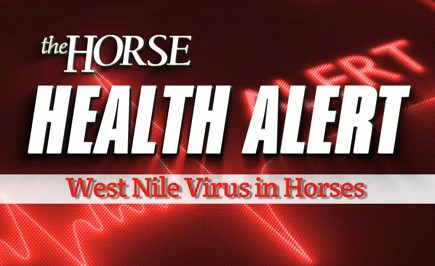California Confirms 12th Equine WNV Case

On Sept. 29, officials at the California Department of Food and Agriculture (CDFA) confirmed a yearling Paint colt in Yuba County tested positive for West Nile virus (WNV). The colt presented on Sept. 18 with neurologic signs that included stiff hindquarters, reluctance to move his head, and lip-to-shoulder fasciculations (twitching). The colt is alive and recovering.
According to the statement, the colt is the state’s 12th confirmed equine case of WNV in 2021. Positive horses have been located in the following counties: Amador (1), Fresno (2), Kings (1), Merced (1), Sacramento (2), San Joaquin (2), Stanislaus (1) and Yuba (2). Eight of the positive horses were not vaccinated against WNV, two had unknown vaccination histories, and two were vaccinated. Ten horses survived, one died, and one was euthanized.
About West Nile Virus
WNV transmission occurs when infected mosquitoes feed on animals, as well as humans, after having fed on infected birds.

Clinical signs of WNV in horses include:
- Mild anorexia and depression
- Fine and coarse muscle and skin fasciculation;
- Hyperesthesia (hypersensitivity to touch and sound);
- Changes in mentation (mentality), when horses look like they’re daydreaming or “just not with it”;
- Occasional drowsiness;
- Propulsive walking (driving or pushing forward, often without control);
- Spinal signs, including asymmetrical weakness; and
- Asymmetrical or symmetrical ataxia.
West Nile virus has no cure; however, some horses can recover with supportive care. Equine mortality rates can reach 30-40%. The American Association of Equine Practitioners includes WNV as one of the core diseases all horses should be vaccinated against at least annually.
Written by:
Edited Press Release
Related Articles
Stay on top of the most recent Horse Health news with















